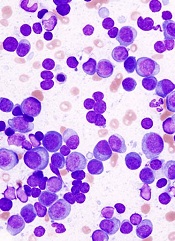
Patients with multiple myeloma (MM) appear to have better survival if they are first diagnosed with monoclonal gammopathy of undetermined significance (MGUS), according to a study published in JAMA Oncology.
The researchers think this may be because patients with MGUS are evaluated more often for signs of progression to MM. They may therefore be diagnosed with MM and started on therapy at an earlier stage than patients who have not been diagnosed with MGUS.
However, the study did not verify that MM patients initially diagnosed with MGUS were followed more closely than their peers.
So, as authors of a related editorial pointed out, it is difficult to confirm a causal relationship between closer follow-up and better prognosis.
Sigurdur Y. Kristinsson, MD, PhD, of the University of Iceland in Reykjavik, and his colleagues conducted this study, evaluating the impact of prior knowledge of MGUS diagnosis and coexisting illnesses on MM survival.
The study included all patients diagnosed with MM in Sweden (n=14,798) from 1976 to 2005. In all, 394 patients (2.7%) had previously been diagnosed with MGUS.
Patients with prior knowledge of MGUS had better overall survival than patients with MM who didn’t know when they had MGUS—a median survival of 2.8 years and 2.1 years, respectively (hazard ratio=0.86, P<0.01).
But patients with prior knowledge of their MGUS status had more coexisting illnesses, including systemic and organ-bound autoimmune diseases (P=0.02 for both), autoimmune diseases without auto-antibodies (P<0.001), infections (P<0.001), ischemic heart disease (P<0.001), heart failure (P=0.03), cerebrovascular diseases (P=0.04), and renal diseases (P<0.001).
Low M-protein concentration at MGUS diagnosis was associated with poorer survival among MM patients with prior knowledge of MGUS. Patients who had M-protein concentrations less than 0.5 g/dL had significantly worse survival than patients with concentrations of 0.5 to 3.0 g/dL (hazard ratio=1.86, P=0.01).
The researchers said the worse survival observed in these patients may be a result of less frequent clinical follow-up.
“Our results reflect the importance of lifelong follow-up for individuals diagnosed as having MGUS, independent of risk score, and highlight the need for better risk models based on the biology of the disease,” the researchers wrote.
“Patients should receive balanced information stressing not only the overall very low risk of progression to malignant neoplasm but also the symptoms that could signal such development and the need to consult their physician.”
Authors of a related editorial—Robert A. Kyle, MD, and S. Vincent Rajkumar, MD, of the Mayo Clinic in Rochester, Minnesota—expressed a somewhat different viewpoint.
“It cannot be determined whether MM patients with a known MGUS in the Icelandic study were followed more closely than those in whom a MGUS was not recognized, and, hence, it is difficult to attribute a causal relationship between follow-up and better prognosis,” they wrote.
“We also need studies to address the question of the possible merits of screening for the presence of MGUS in a normal, older population. The cost, inconvenience, and anxiety produced by the awareness of potential progression of a recognized MGUS, as well as the low absolute risk of progression (0.5% to 1%), probably override the possible potential benefit of screening for MGUS.”


